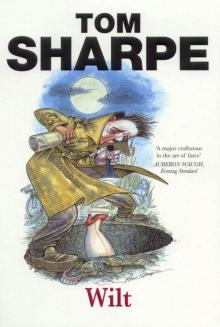- Home
- Tom Sharpe
The Gropes Page 2
The Gropes Read online
Page 2
But for the husbands and the odd son still lurking about, things continued much as they had before. Grope menfolk brewed ale for their wives and distilled various lethal spirits which they called brandy or gin according to their colour as they had for generations, and if they were lucky, or if their wives desired their services that night, were allowed to take the occasional bath in a nearby river.
Gentrification aside, men and women generally went about their business as though nothing material would ever change. But they were wrong.
At the start of the twentieth century coal was found on the estate in larger quantities than ever before and in seams so thick and in such close proximity that not even Adelaide Grope, the one daughter to possess a shrewd business mind and acting head of the family in place of the now senile and bedridden Beatrice, could resist the prospect of immense wealth. The naval arms race with the Kaiser’s Germany had just begun and the demand for coal to build and fuel dreadnoughts was enormous. A narrow railway line was built along the desolate valleys, trucks loaded to the brim trundled down to the great ironworks and shipyards sixty miles to the east and returned filled with sturdy men to work the mines.
Almost overnight the Gropes became relatively rich, both in money and in an apparent surfeit of men who might service the Grope girls, even if they wouldn’t marry them. But it wasn’t to be. The sinister reputation of the family, and nine awful dogs, descendants of the friendly bloodhounds but now decidedly unfriendly, deterred any men, whether new to the district or not. So did the girls. In truth, Beatrice’s daughters, all five of them, retained too many of the physical attributes of their forebears to hold any attraction for even the most desperate man. Soon the miners steered clear of Grope Hall altogether, moving only in groups, a single man being an easy target. From the windows of the Hall predatory eyes watched them clamber out of the empty coal wagons in the morning and cling to the sides of full ones returning at night. There was nothing the Grope girls could do.
Adelaide, however, who retained the ruthless attributes of her ancestors, still found ways to exploit both the new-found Grope riches and the sudden increase in available men. For one thing, she had foreseen the taxation problems that lay in the possession of ostentatious wealth. To ensure that the taxation authorities would be unable to establish the true profit from the mine she had drawn up the contract herself. It was an extraordinary document, to put it mildly. All profits were to be in gold sovereigns payable on a monthly basis, and to be brought to the Hall by the chief accountant of the mining company who was himself privately guaranteed 5 per cent of the unrecorded total. Finally she had persuaded Beatrice, legally still head of the family, to sign the contract with the mining company in the presence of two terrified doctors, one a psychiatrist at a mental hospital, together with a notary public. Since Beatrice had been confused to the point of dementia at the time, Adelaide had paid extravagantly for this privilege, forking out a substantial sum by way of bribery to guarantee the doctors’ and the notary public’s acquiescence that Beatrice was in her right mind
Having secured the Grope family fortunes, Adelaide turned her attention to the vexing problem of securing the female line. And in the tradition of her forebears she concluded that kidnap and enforced captivity was the only viable solution.
Noting the inroads to the Grope estate afforded by the new railway lines, Adelaide embarked upon an ambitious plan by which to strengthen security and to ensure that any stray miners, once seized, stayed seized. After a particularly successful night-time sortie which saw two unsuspecting fellows contentedly fishing Mosedale River wake up several hours later trussed up like chickens under the watchful eye of two of the larger Grope daughters, these precautions took on a new urgency. A notice on the gate went up warning anyone attempting to get down to Grope Hall to ‘BEWARE THE SPANISH FIGHTING BULLS’ and indeed two lithe and dangerous bulls were loosely tethered next to the rough track that served as a drive to the house. After a number of mishaps largely involving gored postmen and an entire absence of any letters, however urgent, for the Grope household, a box had been fastened to the wall beside the gate for the mail.
Adelaide had gone further to ensure that no one intruded and that, once in, no one would get out. The top of the wall had been implanted with iron spikes while especially thickened steel barbed wire was arranged on more iron stakes on the near side of the wall. In fact these precautions were almost counterproductive. The Gropes’ reputation had for centuries sufficed to keep the public at bay and that they had erected what amounted to a formidable defence system aroused a great deal of curiosity. People came over from Brithbury and even further afield to look at the spikes and the peculiar black bulls and of course went home to spread the word that the Grope family’s old traditions had evidently not died out.
‘They must be trying to keep some poor devil trapped in the place’ was the general opinion in the Moseley Arms. ‘Must be a very fierce fellow too to need all those spikes and wire and all. Cost a small fortune to put that lot up at that. Them rich, them Gropes, to afford to do all that. Goodness only knows where they got them bulls from.’
‘Spain supposedly. It says so on the noticeboard.’
An old man by the fire grinned. ‘Supposedly is right,’ he said. ‘Bought the brutes in Barnard Castle is my opinion. No more fighting bulls than I am.’
‘I wouldn’t want to risk going down there for all that,’ said another man. ‘It’s them nine dogs frighten the lights out me. More like wolves than bloodhounds they are.’
News of this gossip reached Adelaide. It didn’t worry her. But the accumulation of so much more wealth than they had ever possessed before, and its effect on her sisters, did. The two unfortunate fishermen had lasted a mere season in the Grope household with only a phantom pregnancy to show for it. And the continued presence of so many brawny miners passing below the house every day unsettled both the Grope women and the tethered bulls. The former spent their time yearning for marriage. The latter yearned too, but for an unspecified kind of consummation.
After several years enduring this pent-up desire Adelaide finally allowed the younger Grope women to go out into the world with sufficient incomes to live in a style to which they were unaccustomed. She wisely kept the bulls tethered.
Freed from the seclusion of Grope Hall and the dominance of Adelaide, the newly released female Gropes rapidly found husbands and settled down in towns and farms across southern England with husbands who knew nothing of the Gropes’ history. By the outbreak of the First World War, Adelaide herself had forced the chief accountant into marrying her by threatening to expose his acceptance of the percentage he received from cooking the books. And a year later she had given birth, much to her joy and to everyone else’s amazement, to a baby girl. By then, mad old Aunt Beatrice had died and Adelaide, determined to celebrate, had completely transformed the interior of Grope Hall while the exterior remained as gaunt as ever. Inside, the rooms were no longer so far behind the times as they had been. Adelaide had had them redecorated and furnished in the most modern style since finding out from the chief accountant that she might write off the refurbishment as a business expense. Only the scrubbed wooden tables and benches in the kitchen and in what was called the study remained. It was here that business was conducted, and Adelaide had no intention of giving away any indication of her wealth. For safety’s sake most of the gold she had converted her profits into was hidden in an unnecessarily deep grave and covered with earth under the stone-flagged floor of the ancient chapel unknown to anyone except Adelaide herself together with the Reverend Nicholas Grope who was never allowed off the premises so scarcely counted. In any case, the effort of digging the grave that contained the gold had damaged his back so badly and he was so old he spent most of his time in bed and was incapable of going anywhere even had he been allowed to.
The twentieth century eventually caught up with the family, though not in the way that might have been expected. The demands of industry during the Great War exhaust
ed the last of the coal in the mine which had already had to be evacuated twice because of flooding and roof falls. But in the end, the war did relatively little to affect the lifestyle of the Gropes.
The first catastrophe came with the Spanish influenza which carried off 20 million people across Europe – more than had died in the fearful War itself. By then Rev. Nicholas’s successor had already died of heart failure and had, quite literally, taken the secret of the family treasure with him as the gold was reburied below his body by Adelaide’s daughter. Finally the Spanish flu killed Adelaide, her daughter and her husband, the chief accountant, who in latter days had largely run the estate under his wife and imperious daughter’s direction. Adelaide’s successor as head of the Grope family was a widow, Mrs Eliza Grope, who had returned to the Hall on her husband’s death, deeply grateful to General Ludendorff for having rid her of her husband, Major Grope in his offensive of March 1918.
On taking charge, Eliza soon restored the old Grope ways since the exhausted mine was no longer a source of income. She’d never enjoyed the modern lifestyle of the South with its stifling politeness, its social niceties and need to conform, and she’d particularly objected to her husband’s assumption that he was the head of the household and she was merely a superior sort of servant. Determined to reassert her dominance, she chose as the new Reverend Grope the orphaned son of a Grope cousin who had been killed in a Zeppelin raid on London. His father, having remarried, no longer wanted the gormless adolescent around and was happy to have Eliza send him to a minor theological college.
Even after the Second World War, and long after Eliza had been succeeded by Myrtle Grope, yet another widow well rid of her partner by the battlefield, the family refused to entirely move with the times. Fields were still turned by horse-drawn ploughs, haystacks retained and cows milked by hand. The bloodhound numbers were reduced to six following an unfortunate incident with one of the bulls, but by and large, had Ursula Grope and Awgard the Pale returned from the twelfth century, they would have been proud to recognise Grope Hall as their own.
It was to this isolated estate and ancient farmhouse that, as the new millennium dawned, Belinda Grope, niece of the now aged Myrtle, brought a young and largely callow youth named Esmond Wiley.
Chapter 3
Esmond Wiley’s boyhood had been a disturbed one. This was largely due to his name.
It was hardly his fault, or even that of his father, that his surname was Wiley, though in his darker moods Esmond had been known to wish that Mr Wiley had remained a bachelor. Or had he felt compelled to marry, which was self-evidently the case, that he had remained celibate or, and this was self-evidently not the case, that he had taken precautions not to impregnate his wife. Not that Esmond blamed his father. Mrs Wiley was not a woman to be denied her right to motherhood. A large and unfortunately cheerful woman, with an insatiable appetite for the most mawkish and deplorable romantic fiction, she had acquired an equally insatiable lust for love. Or to put it another way, she lived in a world in which men, gentlemen of course, proposed marriage passionately on clifftops under a full moon with the waves crashing on the rocks below and were accepted with a mixture of delight and modesty before crushing their maidenly fiancées to their manly breasts.
It has to be said that this was not exactly what Mr Wiley had done. He wasn’t a very manly man in the first place, and being a bank manager in Croydon he had done his level best to resist the slight strain of passion that ran, or rather limped, in the Wiley family. All the same, Mrs Wiley, then Vera Ponson and aged twenty-eight, had persuaded him to propose to her. Worse still, she had insisted on going through the clifftop ritual she had read about so often, and the couple had driven down to Beachy Head when the moon was at its fullest, attired in evening dress which seemed the closest approximation to the satin bustiers and velvet pantaloons referred to so frequently in the romances the future Mrs Wiley favoured. Other things being equal the occasion, or tryst as Vera called it, might yet have fulfilled her wildest dreams. But other things weren’t. The full moon was there somewhere but put in only fitful appearances, hidden for the most part by low clouds. Vera Ponson refused to be disappointed. To her way of thinking those clouds were scudding, and the wind on the clifftop gusted very authentically five hundred feet above a presumably troubled sea. It was too dark to see whether the sea really was troubled or not and in truth, even if it had been as bright as the full moon might have made it, Mr Wiley, by nature and occupation an exceedingly cautious man, had been disinclined to look. He also suffered from a height phobia. It was a measure of his love for Vera or, more accurately, his desperation to attain those home comforts that his married friends appeared to enjoy and which Vera’s innocent romanticism seemed to promise, that he had allowed himself to go anywhere near the perpendicular cliff face in the first place. He had only remembered on the journey down there that it was Beachy Head from which so many people had hurled themselves to their deaths, and confronted with the ghastly reality of the sheer drop which he could see would be impossible to survive, his fear quadrupled.
It was this terror rather than any real passion that had impelled Mr Wiley to propose to Vera with amazing speed and then clasp her to his palpitating heart. He was helped as well by a sudden gust of wind which had practically swept him off his feet at that very moment. With his bride-to-be in his arms, and a very heavy bride-to-be to boot, he felt far safer and, as if to celebrate their union, the moon, as full and brilliant as Vera had wished, shone through a gap in the clouds and illuminated the couple.
‘Oh my darling, how I have waited for this moment,’ Vera murmured ecstatically.
But so it seemed had two policemen. Alerted by a passing motorist who had seen the car and had phoned the station to report that another pair of lunatics were evidently about to commit suicide, they had crept up on the lovers with the utmost stealth.
‘Now now, it’s going to be all right,’ one of the policemen had said as their flashlights added a new brilliance to the scene.
It had not been all right. Horace Wiley had objected to having to identify himself as a bank manager presently residing at 143 Selhurst Road, Croydon, almost as much as the imputation that he had been about to take his own life or, as the sergeant had rather tactlessly put it, ‘the easy way out’.
In later life, Horace Wiley was inclined to conclude that there had been a prophetic quality about the expression, but at the time he was more concerned with the possible consequences for his career prospects if it ever got out that, again in the words of the police sergeant, he ‘made a habit of driving down to Beachy Head at full moon in fancy dress to propose to strange women’, which was more or less what Vera had explained he had been doing. Mr Wiley wished she’d kept her trap shut, a preference which throughout their married life together proved as worthless as it was now, while Vera had found the suggestion that she was a strange woman so offensive that the sergeant came to regret it himself. And then it began to rain.
In short, from these inauspicious beginnings, the marriage in St Agnes’s Church chosen for its literary association (Vera had been deeply affected by the poem at school) and the honeymoon on Exmoor (thanks this time to Lorna Doone), a son and heir emerged and was named Esmond. And it was because of the name Esmond, rather than the more innocuous Wiley, that the offspring of Horace and Vera’s union suffered such a tormented boyhood.
Esmond was called Esmond after a character in a particularly virulent love story his mother had been engrossed in shortly before his birth. In Vera’s dazed and drug-addled state following a horribly difficult labour in which Horace Wiley had been of little and no use, his fear of blood being almost equal to his fear of heights, she found some comfort in picturing the fictional Esmond. A he-man in buckskin breeches with his shirt open to the waist, exposing an immensely virile chest and a mane of the blackest locks windswept on an open moor or, more often, standing on a rocky promontory above a wave-tossed sea, he seemed the best model for a boy who she determined should be nothing
like his timorous and decidedly lacking-in-romance father.
Exposed so early to such awful literary influences, it was perhaps not surprising that Esmond Wiley took at an early age to an activity best described here as lurking. While other boys ran and shouted and skipped and larked about and generally behaved in a boy-like fashion, almost from the moment he first walked Esmond only ever lurked about the place in a manner that was both sneaky and melancholic.
From Esmond’s point of view, his behaviour was entirely understandable. It was bad enough to be called Esmond but to see also the image of Vera’s romantic hero littering the house and on sale in every bookshop and newsagent he went into was enough to make even an insensitive boy aware that he could never live up to his mother’s hopes and expectations.
And Esmond was not an insensitive boy. He was an acutely self-conscious one. No child with his legs and ears, the former thin and the latter thick and protruding, could fail to be aware of himself. Nor could he fail to be equally aware of the shortcomings of his mother who brought to child-rearing the same uncritical and sentimentally old-fashioned attitudes she brought to reading.
To say that she doted on Esmond, or even that he was the apple of her eye, would be to fall far short of the frightful adoration to which the poor boy was subjected. Whenever Vera spotted her son she was particularly addicted to announcing, in public and in a loud voice, ‘Look at this divine creature. His name is Esmond. He is a love child, my sweet darling boy, a true love child,’ a term she had picked up from The Coming of Age of Esmond, ostensibly by Rosemary Beadefield but actually composed by twelve different writers each of whom had written a chapter.

 Blott on the Landscape
Blott on the Landscape Porterhouse Blue
Porterhouse Blue The Wilt Alternative:
The Wilt Alternative: The Great Pursuit
The Great Pursuit Ancestral Vices
Ancestral Vices The Midden
The Midden Vintage Stuff
Vintage Stuff The Throwback
The Throwback Grantchester Grind:
Grantchester Grind: Wilt on High:
Wilt on High: Riotous Assembly
Riotous Assembly Indecent Exposure
Indecent Exposure The Gropes
The Gropes Wilt in Nowhere:
Wilt in Nowhere: The Wilt Inheritance
The Wilt Inheritance Wilt:
Wilt: The Wilt Alternative
The Wilt Alternative The Wilt Alternative w-2
The Wilt Alternative w-2 Grantchester Grind
Grantchester Grind Wilt on High
Wilt on High Wilt w-1
Wilt w-1 Wilt
Wilt The Wilt Inheritance (2010)
The Wilt Inheritance (2010) Wilt in Nowhere
Wilt in Nowhere Wilt in Nowhere w-5
Wilt in Nowhere w-5 Wilt on High w-3
Wilt on High w-3